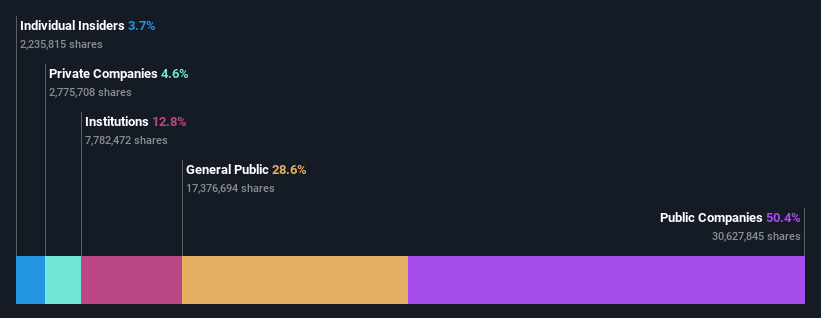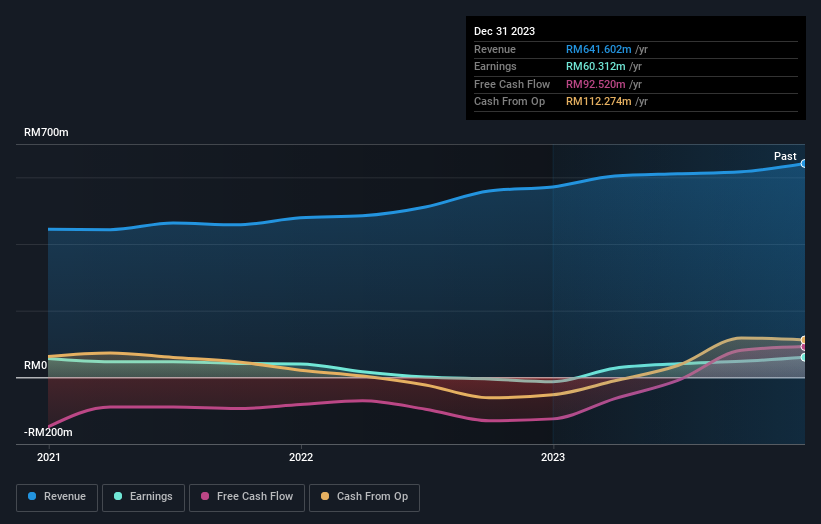Ajinomoto (Malaysia) Berhad's (KLSE:AJI) stock price dropped 15% last week; public companies would not be happy

Key Insights
- Significant control over Ajinomoto (Malaysia) Berhad by public companies implies that the general public has more power to influence management and governance-related decisions
- The largest shareholder of the company is Ajinomoto Co., Inc. with a 50% stake
- 13% of Ajinomoto (Malaysia) Berhad is held by Institutions
Every investor in Ajinomoto (Malaysia) Berhad (KLSE:AJI) should be aware of the most powerful shareholder groups. The group holding the most number of shares in the company, around 50% to be precise, is public companies. In other words, the group stands to gain the most (or lose the most) from their investment into the company.
As a result, public companies as a group endured the highest losses last week after market cap fell by RM169m.
Let's delve deeper into each type of owner of Ajinomoto (Malaysia) Berhad, beginning with the chart below.
Check out our latest analysis for Ajinomoto (Malaysia) Berhad

What Does The Institutional Ownership Tell Us About Ajinomoto (Malaysia) Berhad?
Many institutions measure their performance against an index that approximates the local market. So they usually pay more attention to companies that are included in major indices.
We can see that Ajinomoto (Malaysia) Berhad does have institutional investors; and they hold a good portion of the company's stock. This can indicate that the company has a certain degree of credibility in the investment community. However, it is best to be wary of relying on the supposed validation that comes with institutional investors. They too, get it wrong sometimes. When multiple institutions own a stock, there's always a risk that they are in a 'crowded trade'. When such a trade goes wrong, multiple parties may compete to sell stock fast. This risk is higher in a company without a history of growth. You can see Ajinomoto (Malaysia) Berhad's historic earnings and revenue below, but keep in mind there's always more to the story.

We note that hedge funds don't have a meaningful investment in Ajinomoto (Malaysia) Berhad. Ajinomoto Co., Inc. is currently the company's largest shareholder with 50% of shares outstanding. This essentially means that they have extensive influence, if not outright control, over the future of the corporation. In comparison, the second and third largest shareholders hold about 3.0% and 2.1% of the stock.
Researching institutional ownership is a good way to gauge and filter a stock's expected performance. The same can be achieved by studying analyst sentiments. We're not picking up on any analyst coverage of the stock at the moment, so the company is unlikely to be widely held.
Insider Ownership Of Ajinomoto (Malaysia) Berhad
While the precise definition of an insider can be subjective, almost everyone considers board members to be insiders. Company management run the business, but the CEO will answer to the board, even if he or she is a member of it.
Most consider insider ownership a positive because it can indicate the board is well aligned with other shareholders. However, on some occasions too much power is concentrated within this group.
We can see that insiders own shares in Ajinomoto (Malaysia) Berhad. It has a market capitalization of just RM986m, and insiders have RM36m worth of shares, in their own names. It is good to see some investment by insiders, but it might be worth checking if those insiders have been buying.
General Public Ownership
With a 29% ownership, the general public, mostly comprising of individual investors, have some degree of sway over Ajinomoto (Malaysia) Berhad. While this group can't necessarily call the shots, it can certainly have a real influence on how the company is run.
Private Company Ownership
We can see that Private Companies own 4.6%, of the shares on issue. It might be worth looking deeper into this. If related parties, such as insiders, have an interest in one of these private companies, that should be disclosed in the annual report. Private companies may also have a strategic interest in the company.
Public Company Ownership
It appears to us that public companies own 50% of Ajinomoto (Malaysia) Berhad. This may be a strategic interest and the two companies may have related business interests. It could be that they have de-merged. This holding is probably worth investigating further.
Next Steps:
While it is well worth considering the different groups that own a company, there are other factors that are even more important. For example, we've discovered 1 warning sign for Ajinomoto (Malaysia) Berhad that you should be aware of before investing here.
Of course this may not be the best stock to buy. So take a peek at this free free list of interesting companies.
NB: Figures in this article are calculated using data from the last twelve months, which refer to the 12-month period ending on the last date of the month the financial statement is dated. This may not be consistent with full year annual report figures.
New: Manage All Your Stock Portfolios in One Place
We've created the ultimate portfolio companion for stock investors, and it's free.
• Connect an unlimited number of Portfolios and see your total in one currency
• Be alerted to new Warning Signs or Risks via email or mobile
• Track the Fair Value of your stocks
Have feedback on this article? Concerned about the content? Get in touch with us directly. Alternatively, email editorial-team (at) simplywallst.com.
This article by Simply Wall St is general in nature. We provide commentary based on historical data and analyst forecasts only using an unbiased methodology and our articles are not intended to be financial advice. It does not constitute a recommendation to buy or sell any stock, and does not take account of your objectives, or your financial situation. We aim to bring you long-term focused analysis driven by fundamental data. Note that our analysis may not factor in the latest price-sensitive company announcements or qualitative material. Simply Wall St has no position in any stocks mentioned.
About KLSE:AJI
Ajinomoto (Malaysia) Berhad
Manufactures and sells monosodium glutamate and other related products in Malaysia.
Flawless balance sheet with solid track record and pays a dividend.
Similar Companies
Market Insights
Community Narratives




